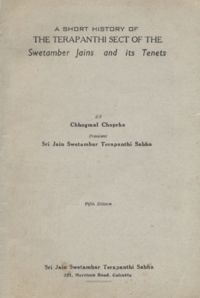Speech delivered by the Rev. Dr. Charles W. Gilkey, Barrows Professor of Religions, Chicago, U.S.A., on a visit to the Eighth Archarya of the Terapanthi Swetambar Jains, at Rajaldesar (Bikaner) on 1st January, 1925.
My Friends,
One of the first invitations which we received when we reached India was that from your Honorary Secretary and his associates in Calcutta; and the Chairman of the Barrows Lectures Committee Dr. S. K. Dutta telling us of the high standing of your members in Calcutta and cities, advised us to accept it. This we were ourselves eager to do and for more than a month we have looked forward to this visit to your community with special anticipation. May I say at once that our experiences here among you these two days have exceeded all our highest expectations and that we shall always remember them as among the most delightful and instructive of our whole Indian tour.
I shall like first to express for Mrs. Gilkey and her father Dr. Brown as well as for myself, our deep gratitude for all your kindness and hospitality, first and foremost to your Honorary Secretary Seth Keshari Chand Kothari and his associates Messrs. Champalal Baid, Shubhkaran Surana, and Hemraj Chopra who have accompanied us from Delhi and made most generous and thoughtful provision at every point both on the journey and here, for our comfort and convenience; next, to your whole community gathered here, who have received us with such cordial welcome; to Gulab Chand Kothari and Fateh Chand Kothari son and grandson of Seth Keshari Chand Kothari for their poem and particularly to His Most Exalted Holiness Sri Sri Sri Kaluramji Maharaj for his kindly welcome and careful explanation of the principles of the Jain Swetambari Terapanthi Sect.
We have been greatly impressed by the high moral tone and ethical standards of this teaching; by the sincerity and devotion of the Sadhus and Sadhwis; and by the strict austerity of their rule of life at which we have marvelled; by the loyalty of the whole community to their principles and their teachers and by the spirit of inward happiness and peace which is so evident in your leaders. We shall report to our friends in India, Europe and America what we have seen and felt among you and tell them of the many admirable things we have found both in your religious teachings and practice.
I have been sent to India as Barrows Lecturer by the University of Chicago in America following such eminent scholars and teachers as Dr. J. H. Barrows, principal A. M.. Cairbairn, Dr. Charles Cuthbert Hall, and Dr. C. R. Henderson. The purpose of the lectures was thus stated by the donor Mrs. Haskell who established them shortly after the world's Parliament of Religions in Chicago in 1893: "A course of lectures to be given by leading Christian Scholars of Europe, Asia and America in which in a friendly, temperate and conciliatory way, and in the fraternal spirit which pervaded the Parliament of Religions, the great question of the truth of Christianity, its harmonies with the truths of other religions, its rightful claims and the best methods of setting them forth, should be presented to the scholarly and thoughtful people of India". In the spirit and purpose of this notable foundation I am giving six lectures on "The personality of Jesus" in the chief student centres of India and Burma, Bombay, Lucknow, Lahore, Calcutta, Rangoon, and Madras. I count it a real contribution to the better mutual understanding between East and West, which these lectures were found to promote, that we have been able to learn so much more at first hand about the Jain Swetambar Terapanthi from its leaders themselves. I shall not fail to include this in the reports, I make, when I return to America.
In conclusion, may I point out that some of the fundamental Jain teachings are receiving in your own day new recognition and wider influence not only in India but throughout the world. All good Jains must rejoice in the growing spirit of kindness to animals which has promoted such organisation in America as the society for the prevention of cruelty to animals; in the new laws and customs about dress and sport which lessen the destruction of bird and animal life, in the adoption of national prohibition by the United States; and especially in the movements to outlaw and eventually to abolish war which is rapidly gaining strength all through America and Europe. This wider recognition of certain great principles, which Jains have always emphasized, suggests to us that if the different sects among Jains can learn to co-operate more c losely with each other as well as with other religious bodies that share these great convictions, they may have a still wider influence in the future.
Finally may I thank you all again for all your kindness and on this the first day of our Christian year 1925 wish you all, and all your Jain Swetambar Terapanthi Community a very happy and prosperous new year.
Rajaldesar (Bikaner)
January 1st, 1925
Your sincere Friend
Charles W. Gilkey
 Chhogmal Choprha
Chhogmal Choprha
